While Gmail is the default choice for several users out there, there comes a point where you simply want to try something new. Or, you probably just want to stop relying on the Google ecosystem too much and take a more privacy-focused route. If you can relate and are on the lookout for the best Gmail alternatives, take a look at this comprehensive list that we’ve handpicked!
1. ProtonMail
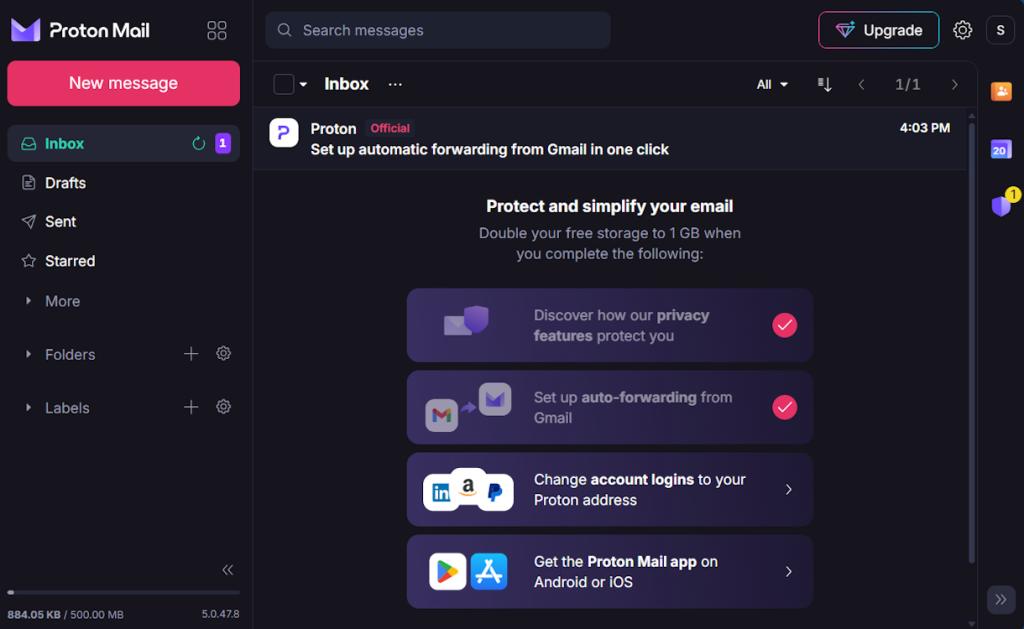
ProtonMail is a Swiss-made and privacy-friendly alternative to Gmail. It offers end-to-end encryption and does not require any personal information while creating an email account. Yes, you can choose to not give away your phone number. For security, ProtonMail uses open-source encryption libraries. The company says it uses secure implementations of AES-256 (better known as military-grade encryption), RSA, and OpenPGP.
While you have to opt for the paid version for using all the features, the free tier offers 500MB of mail storage and a limit of 150 messages per day. For other features, including custom filters, using your own domain, and priority customer support, you can choose the Plus plan that costs $3.99 per month.
| PROS | CONS |
|---|---|
| Solid End-to-End and Zero-access Encryption | Free version offers very limited storage |
| User-friendly interface | |
| Paid version is economical |
2. Outlook
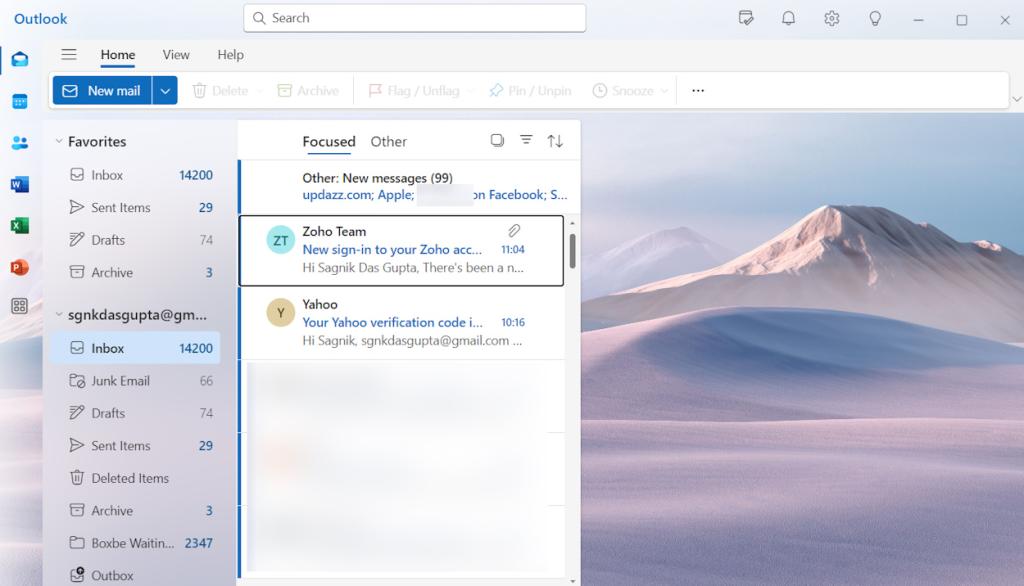
If you use Microsoft’s services, you have probably heard of Outlook. In case you haven’t, Outlook is Microsoft’s email offering. Just like Gmail, Outlook has integrations with Microsoft’s productivity apps such as Word, Excel, PowerPoint, and OneNote. However, it is worth mentioning that the free tier of Outlook has ads.
Getting rid of ads will cost you $6.99 per month or $69.99 per year with the Microsoft 365 Personal plan. You also get access to 50GB of mailbox storage (15GB on the free version), custom domain names, and 1TB of OneDrive storage with the subscription. Outlook is a popular Gmail alternative for businesses.
| PROS | CONS |
|---|---|
| Integration with Microsoft Office Suite | Not as integrated with non-Microsoft services |
| Neat and well-organized interface | |
| Free version offers 15GB of mailbox storage |
3. Edison Mail

If you want a Gmail alternative that’s organized and lets you manage your emails all too well, Edison Mail is the way to go. Edison Mail is known for being super lightweight and fast. On top of that, there’s a dedicated Focused Inbox mode that automatically identifies important emails and prioritizes them. You also get up to 10GB of free storage with Edison Mail, alongside a Smart Assistant that helps you sort through emails like a pro, keep track of your calendar, clean up emails, and more!
Additionally, Edison lets you view and bulk unsubscribe from promotional emails at one go, which is beyond handy. Another important thing to note is that Edison doesn’t scan its users for advertising purposes, making it all the more secure. While the basic version of Edison is free to use and free of ads, there is Edison+ if you want a couple of additional security features. Edison Mail+ starts at $14.99 per month or $99.99 per year.
| PROS | CONS |
|---|---|
| Unsubscribing to junk made easy | Premium is very expensive |
| Smart Assistant is quite useful | |
| Multi-platform compatibility |
4. Shortwave
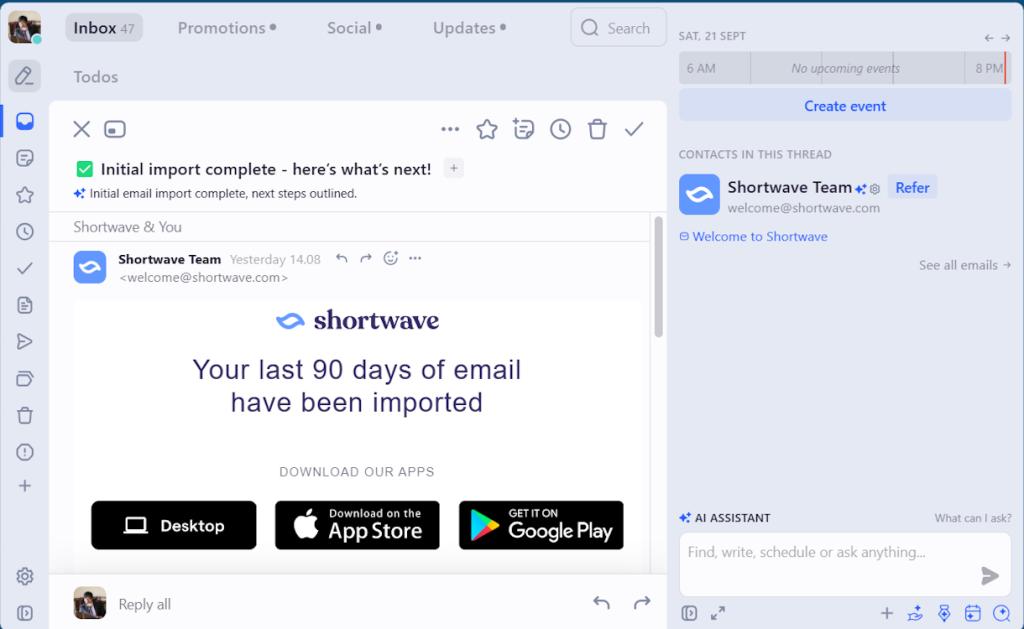
AI is everywhere, so why should your email management be left out? Shortwave is the best possible example of integrating AI into your workspace, thanks to what the makers call Ghostwriter. This AI assistant lets you summarize emails and conduct smart searches to save a lot of time.
Moreover, since Shortwave is made by ex-Google folks, you see it retain some of those useful features like snoozing and pinning emails, undoing send, customizing notifications, email categories, and more. All of that easily makes it one of the smartest and best Gmail alternatives.
However, Shortwave only works with Google accounts, so there’s that. Besides, since it leverages Google accounts, the storage limit depends on how much storage you have on your Gmail account. Paid plans start at $7 per month, billed annually. Or, if you want to take a monthly approach solely, you can get it for $8.50.
| PROS | CONS |
|---|---|
| AI-powered features like Email Summarization | Only integrates with Google |
| Free version is adequate | Learning curve can be steep |
| Attractive interface |
5. Zoho Mail
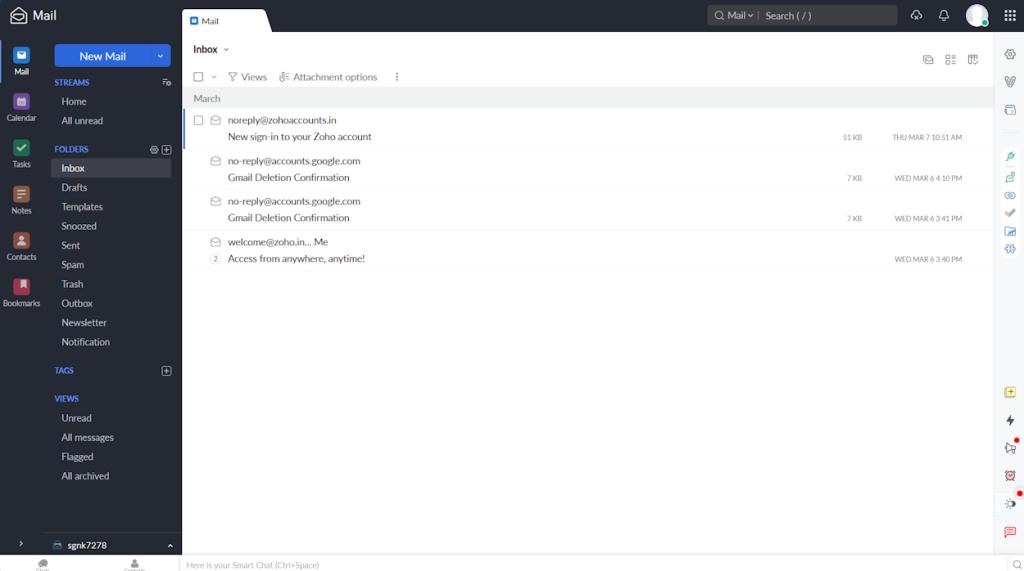
Zoho Mail is another option you can consider if you’re looking for a Gmail alternative. What makes Zoho Mail an attractive choice is that it offers an ad-free experience, even for free users. You also get 5GB of storage in the free tier, along with access to Zoho’s diverse workplace apps.
Furthermore, Zoho even offers a free plan for small businesses with up to five users. That is enticing if you are just getting started with your startup and want email hosting for a single domain. You can also opt for Zoho’s Mail Lite, Mail Premium, or Workplace plans for more users and additional features.
| PROS | CONS |
|---|---|
| Integrates very well with the entire Zoho Suite | Not the most user-friendly interface |
| Free version is ad-free | |
| Uses TLS and S/MIME security protocols |
6. Tuta (Formerly Tutanota)
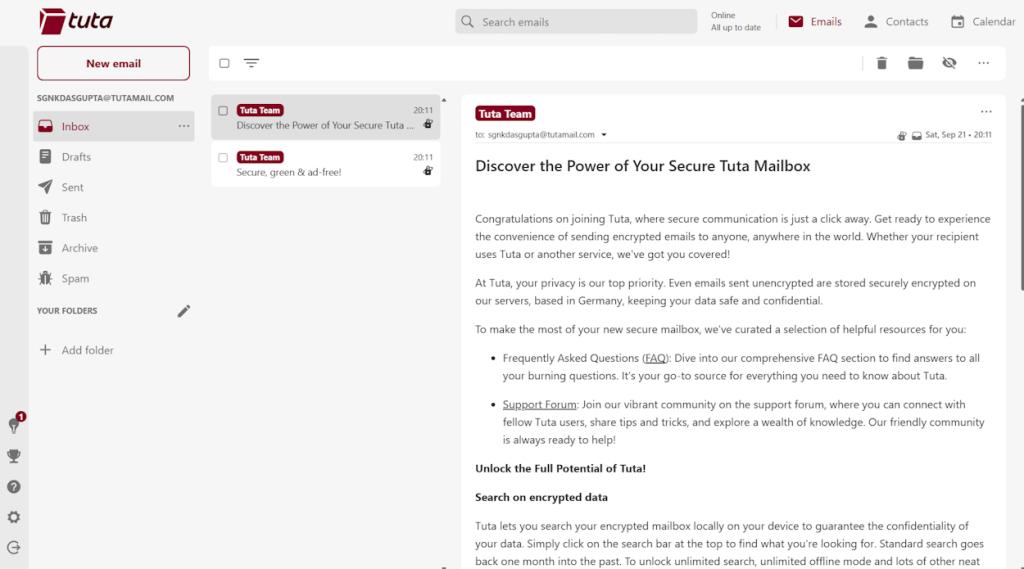
Tutanota is yet another popular open-source and privacy-focused email service that offers encrypted email service with E2E encryption. The German company stores your encrypted emails in secure data centers in the country and is compliant with GDPR. Like Zoho Mail, Tutanota offers an ad-free experience for free.
With Tutanota’s free tier, you get 1GB of storage, a single calendar, and limited search options. The paid plans offer up to 10GB of storage, and you can get additional storage with separate storage subscriptions. To make the process a bit more secure, Tuta also makes you go through a 48-hour verification process, post which you will be able to make the most use of its services.
| PROS | CONS |
|---|---|
| Free version has no message limits | Can search for only up to a month-old encrypted messages |
| Super secure and doesn’t profile accounts for advertising purposes | The 48-hour verification process may be off-putting for some |
| Very easy to use |
7. Fastmail
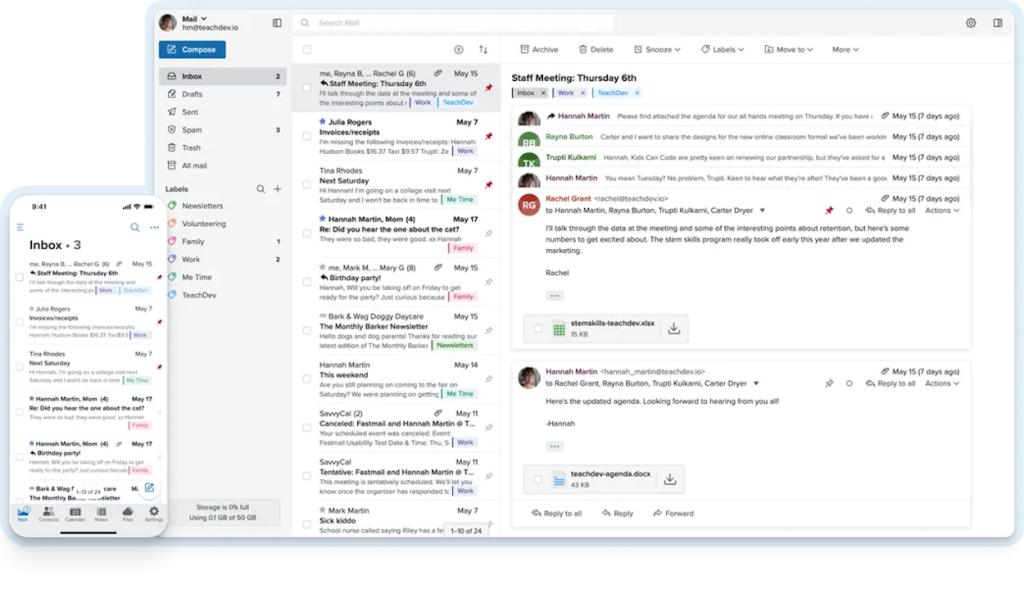
Just like Tuta and Edison Mail, Fastmail doesn’t go through your emails for advertising purposes. On top of that, you get to enjoy top-tier TLS, SSL, and PFS encryption protocols, alongside working with YubiKey Nano and YubiKey Standard. It’s also 100% ad-free, and you have complete ownership of your data, unlike on Gmail, where work emails are practically owned by your employer.
Additionally, your emails are masked to hide the IP addresses and offer secure logins. You can access Fastmail not just via the web, but there are dedicated Android and iOS apps in place for it, all of which are said to have phenomenal user interfaces. You also get at least 60GB of storage, which you can further expand as per your usage. Users can also create custom domain names as well as multiple aliases with Fastmail.
Now, if you’re willing to take the paid route as well and get one of the best Gmail alternatives, Fastmail is your way to go. However, plans are not too expensive either, starting at just $4.67 per month, costing you $168 billed every 36 months. If you want to take the monthly route, it will set you back $6. In addition, you also get a free trial of 30 days, so there’s that.
| PROS | CONS |
|---|---|
| Quite affordable | No free version |
| Top-tier security and privacy features | |
| Custom domain and multiple alias creation |
8. Yahoo Mail
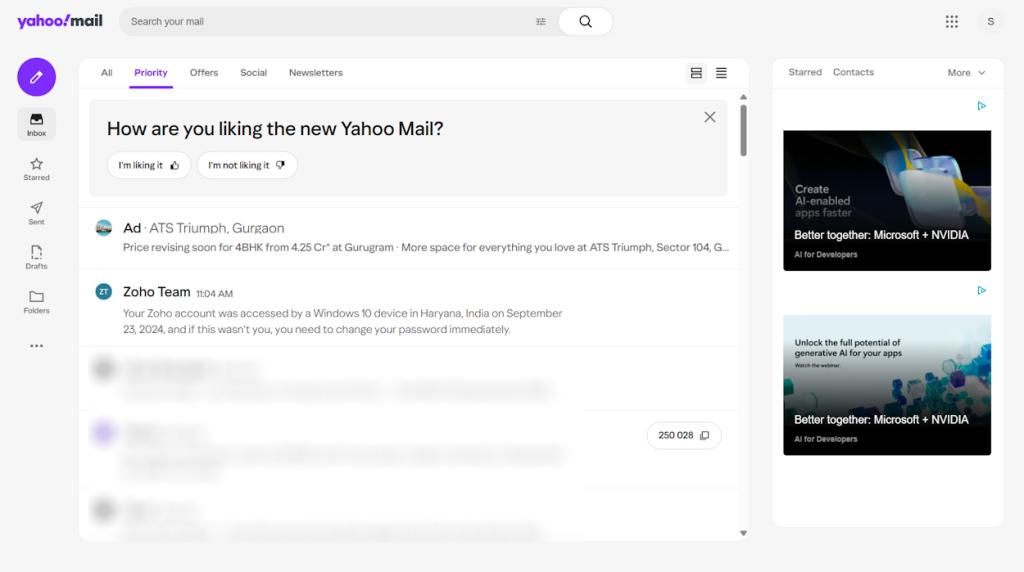
Yahoo might not be as popular as it used to be before, but Yahoo Mail is still a neat alternative to Gmail. One attractive aspect of Yahoo Mail is that it offers a whopping 1TB of storage to free users. However, the catch is – the maximum file size for an attachment is 25MB.
Apart from that, you can customize the look and feel of Yahoo Mail with themes. Also, Yahoo Mail lets you manage all your email addresses in one place, use filters, group conversations, view emails by topic, and more. Most importantly, Yahoo mails use TLS encryption in transit. With all that said, do keep in mind that you will see ads on the free version.
| PROS | CONS |
|---|---|
| Staggering amount of free storage | 25MB maximum file attachment size |
| Secure and reliable | Too many ads |
| Custom domain and alias creation |
So, those are the best Gmail alternatives in 2024 with more storage space, privacy features, and sign-up options that don’t require you to enter a phone number or address. Do you use any other email service that’s not mentioned in the list here? Let us know if that’s the case, along with the reason why you chose it in the comments section below.
Unknown 9 Awakening Review: A Failed Implementation To A Fantastical Story
Anime Vanguards Update 1 Release And Time Revealed (Updated)
The Penguin Episode 3 Ending Explained: Is Sofia Falcone Dead?

:max_bytes(150000):strip_icc()/fastmail-9b3235e13d7f46f5b5d6b0f5aab06f73.jpg)
